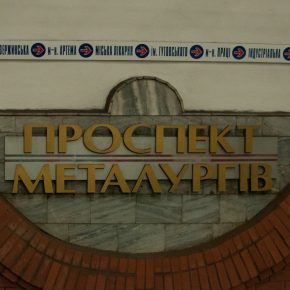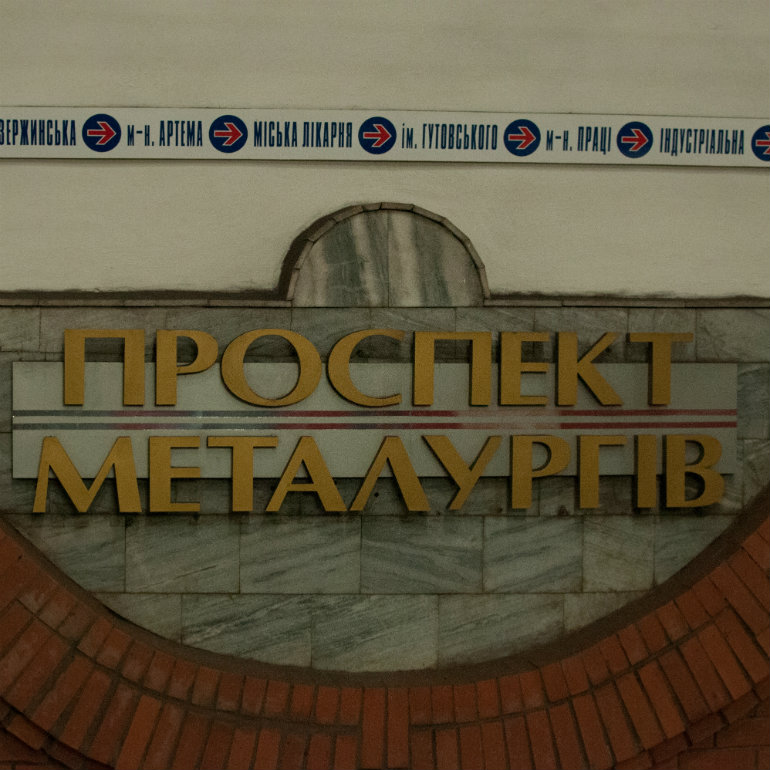
ArcelorMittal Kryvyi Rih, Kryvyi Rih, Ukraine (Alan Turgutoglu, CC BY)
It still remains one of the main sources of foreign exchange earnings but it consumes more than it pays into the state budget.
In the latest ranking of the World Steel Association, Ukraine was ranked 10th on the list of the world’s largest producers, with steel production that reached 22.9 million tons in 2015. That was in spite of the 15.6 per cent decrease recorded in comparison with 2014.
According to the data of the State Fiscal Service of Ukraine the value of steel exports exceeded USD8bn in 2015, which represented 21 per cent of export revenues. This means that Ukrainian steel industry ranked second after agriculture in terms of foreign exchange earnings.
Priority or not?
The figures would be much higher, if the owners of the steel companies didn’t move their capital to tax havens.
The Ukrainian steel exports, almost in their entirety, have for years been leaving the country at artificially lowered prices – they are purchased by companies owned by the oligarchs and registered in tax havens. They are the ones making a profit. This mechanism allows the oligarchs to avoid paying taxes in Ukraine. As a result, the State budget only receives a small part of the sum which should be collected due to income tax.
According to information provided as early as 2011 by Vladimir Osipov, the Head of Department of Social and Economic Development of the Institute of Market Issues and Socio-Economic Research of the National Academy of Sciences of Ukraine, 13 of the 14 steel companies made use of intermediary companies registered in tax havens for the purpose of tax “optimization”. “All the export streams of steel production go through tax havens. Money is laundered at the expense of the interests of the Ukrainian people,” he informed.
According to Vladimir Dergachev’s research published in the collective work “Economic Innovation” dedicated to Ukraine’s economy, Rinat Akhmetov’s company, SKM, is utilizing the intermediation of 25 companies registered in tax havens for the purposes of “tax optimization” and the optimization itself “is turning into a complete evasion of taxes”.
“The main problem of Ukrainian steel industry is the almost complete loss of state control over this strategic branch. In 1982 a decree on the avoidance of double taxation with Cyprus was issued. After the declaration of independence of Ukraine this enabled the majority of the steel companies from the Donetsk-Pridneprovsk region to move to tax havens. The new private owners have used the Ukrainian authorities mainly to obtain preferences. By now the Ukrainian authorities have almost completely lost control of domestic steel industry, which assets and profits have been siphoned out abroad,” says Dergachev.
Looking for a work around
The oligarchs are also benefiting within Ukraine. In 2015 the biggest Ukrainian steel producer Metinvest – the holding of the oligarch Rinat Akhmetov – paid UAH14bn (EUR480m) in taxes to the budget. These are the company’s data. Mikheil Saakashvili, the governor of the Odessa Oblast, said in December 2015 during the anti-corruption forum in Odessa, that at the same time Akhmetov’s holding avoided paying EUR1.9bn (that is approx. UAH48bn) to the Ukrainian Railways by unlawfully taking advantage of lower transport tariffs.
The Ukrainian authorities are flabbergasted, as on the one hand, they are aware of the facts, and on the other hand, due to their links to the oligarchic system ruling Ukrainian steel industry, they are forced to respect the interests of the owners.
“Today the priority branches are the Ukrainian agricultural and food sector, the IT industry, energy efficiency and investments in nuclear energy. Steel industry is no longer on the list, it requires huge investments,” announced the Ukrainian President Petro Poroshenko during an annual press conference in mid-January. He has extensive interests in the energy and food sector, rather than the steel one. His speech sparked outrage among the steel magnates.
“The past year, unfortunately, wasn’t very good for Ukrainian steel industry. The decline in production exceeded 15 per cent. This was largely associated with the hostilities in the east of the country, with the situation in the Donbas. At the same time, steel industry remains in second place in terms of the country’s foreign exchange inflows, which allows to stabilize the hryvnia exchange rate. Steel industry remains one of the major tax payers. The mining-steel complex, along with the related branches, provides jobs to over one million of our citizens,” argued the Director of Metinvest Group Yuri Ryzhenko.
“Foreign exchange earnings from steel and iron production allow the government and the central bank to stop the hryvnia from further depreciation, which in turn could lead to a political disaster and the collapse of the entire economy. Steel industry is a strategic sector of the economy in all countries of the world. Let’s assume for a moment that Ukraine decides to take its own path, discarding the experiences of developed countries. In that case, we should decide what to do with the roughly one million Ukrainians working in steel and related sectors. They will all be left without work and without income. And that is half of all the people employed in the industry,” warns the service Minprom representing the interests of steel, iron and mining industry.
As a result, at the end of January the president changed his mind. “Steel industry, and the workers of the steel and iron companies, are one of the priorities of the state and there is no place for discussion in this regard. We should protect the jobs of the steel industry but unfortunately, at present, it is only a raw materials branch thus is not fully competitive,” he declared.
According to the economist Oleksandr Zholud, for Ukraine further reliance on steel industry is a road to nowhere. “In steel industry today China has become the largest producer in this branch and is pushing Ukraine out of many markets, particularly Asian ones which are priority for our exporters. Taking into account the drop in demand and China’s expansion, we can assume that the prices for steel and iron products will remain low in 2016. Such a situation does not allow Ukraine to hope for high proceeds from exports,” he assessed.
That, in turn, means a dramatic reduction in Ukraine’s future foreign exchange earnings and an even greater imbalance between money taken from the budget by the sector and the money contributed.
Who rules the Ukrainian steel industry
According to information gathered by journalists from the investigative site The Insider, the Ukrainian steel industry is controlled by several oligarchic groups from the post-Soviet region, complemented by a few international players.
The Metinvest B.V. holding company, registered in the Netherlands and belonging to the Donetsk oligarch Rinat Akhmetov, was formed in 2006, and a year later took over the Smart Holding steel plants of the Russian oligarch Vadim Novinsky. The majority of the holding’s plants are located in the Donbas territories seized by the pro-Russian militias, and Akhmetov himself is accused of sponsoring the armed groups operating in Donbas (Akhmetov’s financing of the fighters was mentioned, among others, by the separatist “people’s governor” of Donetsk Pavel Gubarev in the spring of 2014).
Metinvest also controls the Azovstal steel and iron plant in Mariupol, as well as plants in Yenakiyevo, Makiivka, Khartsyzsk and Avdiivka. Metinvest also has a 49% stake in the Zaporozhstal steel plant in Zaporozhye, while the remaining interest is controlled by a group of “Russian investors” who remain in the shadows. In 2013 Metinvest produced 12.4 million tons of steel, which represented 38 per cent of Ukrainian steel production.
The Industrial Union of Donbas (ISD) is the owner of the steel and iron conglomerate in Alchevsk and the Dnipropetrovsk Steel Plant in Dniprodzerzhynsk. In 2013 they produced a total of 7.1 million tons of steel, which represented 21 per cent of the total steel production in Ukraine. In 2014, the Alchevsk plant located in the territories conquered by the pro-Russian separatists suspended production because the ore supplies were cut off.
The Indiancompany ArcelorMittal owns one of Ukraine’s largest metallurgical combines – in Krivoi Rog, as well as the chemical plants in Beryslav in the Kherson Oblast and a trans-shipment company in the seaport in Nikolaev. In 2013 ArcelorMittal produced 6.4 million tons of steel (20 per cent of the total production).
The Evraz holding, belonging to the Russian oligarch Roman Abramovich, who is closely connected with the Kremlin, controls a 90 per cent stake in the Petrovsky Dnipropetrovsk Steel Plant in Dnipropetrovsk, which produced approx. 1 million tons of steel in 2013 – 3 per cent of the total Ukrainian production. The Interpipe company, which belongs to the oligarch Viktor Pinchuk, the son-in-law of Ukraine’s former President Leonid Kuchma, has three factories producing pipes and the Interpipe Steel plant in Dnipropetrovsk, which produced 1 million tons of steel in 2013 – 3 per cent of the total Ukrainian production.
The Privat Group, controlled by the oligarchs Ihor Kolomoyskyy and Henadiy Boholyubov, is the owner of the Zaporozhye Ferro Alloys Plant and the Stakhanov Ferro Alloys Plant, and also has a stake in the Nikopol Ferro Alloys Plant.
VS Energy, controlled by the Russian oligarch Alexander Babakov, has a stake in the Dneprospetsstal steel plant in Zaporozhye, which produces special brands of steel. In 2013 they released less than 1 per cent of the total Ukrainian steel production into the market.
The Fintest Trading holding, registered in Cyprus and controlled by the Russian oligarch Victor Nusenkis, controls the Donetskstal-MZ and Donetsk Metallurgical Plant located in Donetsk. Due to the hostilities in the Donbas region the company ceased production.

